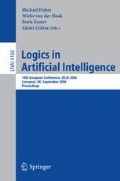Abstract
We develop a dynamic modal logic that can be used to model scenarios where agents negotiate over the allocation of a finite number of indivisible resources. The logic includes operators to speak about both preferences of individual agents and deals regarding the reallocation of certain resources. We reconstruct a known result regarding the convergence of sequences of mutually beneficial deals to a Pareto optimal allocation of resources, and discuss the relationship between reasoning tasks in our logic and problems in negotiation. For instance, checking whether a given restricted class of deals is sufficient to guarantee convergence to a Pareto optimal allocation for a specific negotiation scenario amounts to a model checking problem; and the problem of identifying conditions on preference relations that would guarantee convergence for a restricted class of deals under all circumstances can be cast as a question in modal logic correspondence theory.
Access this chapter
Tax calculation will be finalised at checkout
Purchases are for personal use only
Preview
Unable to display preview. Download preview PDF.
References
Sandholm, T.W.: Contract types for satisficing task allocation: I Theoretical results. In: Proc. AAAI Spring Symposium: Satisficing Models (1998)
Endriss, U., Maudet, N., Sadri, F., Toni, F.: Negotiating socially optimal allocations of resources. Journal of Artificial Intelligence Research 25, 315–348 (2006)
Dunne, P.E., Wooldridge, M., Laurence, M.: The complexity of contract negotiation. Artificial Intelligence 164(1-2), 23–46 (2005)
Parikh, R.: Social software. Synthese 132, 187–211 (2002)
Pacuit, E., Parikh, R.: Social interaction, knowledge, and social software. In: Interactive Computation: The New Paradigm. Springer, Heidelberg (forthcoming)
Pauly, M., Wooldridge, M.: Logic for mechanism design: A manifesto. In: Proc. 5th Workshop on Game-theoretic and Decision-theoretic Agents (2003)
Blackburn, P., de Rijke, M., Venema, Y.: Modal Logic. Cambridge University Press, Cambridge (2002)
Harel, D., Kozen, D., Tiuryn, J.: Dynamic Logic. MIT Press, Boston (2000)
Moulin, H.: Axioms of Cooperative Decision Making. Cambridge University Press, Cambridge (1988)
van Benthem, J., van Otterloo, S., Roy, O.: Preference logic, conditionals and solution concepts in games. In: Modality Matters: Twenty-Five Essays in Honour of Krister Segerberg, University of Uppsala (2006)
Hansson, S.O.: Preference logic. In: Handbook of Philosophical Logic, 2nd edn. Kluwer Academic Publishers, Dordrecht (2001)
Dunne, P.E., Chevaleyre, Y.: Negotiation can be as hard as planning: Deciding reachability properties of distributed negotiation schemes. Technical Report ULCS-05-009, Department of Computer Science, University of Liverpool (2005)
Lange, M.: Model checking propositional dynamic logic with all extras. Journal of Applied Logic 4(1), 39–49 (2005)
Chevaleyre, Y., Endriss, U., Lang, J., Maudet, N.: Negotiating over small bundles of resources. In: Proc. 4th International Joint Conference on Autonomous Agents and Multiagent Systems. ACM Press, New York (2005)
Passy, S., Tinchev, T.: An essay in combinatory dynamic logic. Information and Computation 93(2), 263–332 (1991)
Balbiani, P., Vakarelov, D.: Iteration-free PDL with intersection: A complete axiomatization. Fundamenta Informaticae 45, 1–22 (2001)
Fischer, M.J., Ladner, R.E.: Propositional dynamic logic of regular programs. Journal of Computer and System Sciences 18(2), 194–211 (1979)
Pratt, V.R.: Semantical considerations on Floyd-Hoare logic. In: Proc. 17th Annual Symposium on Foundations of Computer Science, pp. 109–121. IEEE, Los Alamitos (1976)
Lutz, C., Walther, D.: PDL with negation of atomic programs. Journal of Applied Non-Classical Logics 15(2), 189–214 (2005)
Danecki, R.: Non-deterministic propositional dynamic logic with intersection is decidable. In: Proc. 5th Workshop on Computation Theory. Springer, Heidelberg (1985)
Lange, M., Lutz, C.: 2-EXPTIME lower bounds for propositional dynamic logics with intersection. Journal of Symbolic Logic 70(4), 1072–1086 (2005)
Author information
Authors and Affiliations
Editor information
Editors and Affiliations
Rights and permissions
Copyright information
© 2006 Springer-Verlag Berlin Heidelberg
About this paper
Cite this paper
Endriss, U., Pacuit, E. (2006). Modal Logics of Negotiation and Preference. In: Fisher, M., van der Hoek, W., Konev, B., Lisitsa, A. (eds) Logics in Artificial Intelligence. JELIA 2006. Lecture Notes in Computer Science(), vol 4160. Springer, Berlin, Heidelberg. https://doi.org/10.1007/11853886_13
Download citation
DOI: https://doi.org/10.1007/11853886_13
Publisher Name: Springer, Berlin, Heidelberg
Print ISBN: 978-3-540-39625-3
Online ISBN: 978-3-540-39627-7
eBook Packages: Computer ScienceComputer Science (R0)

